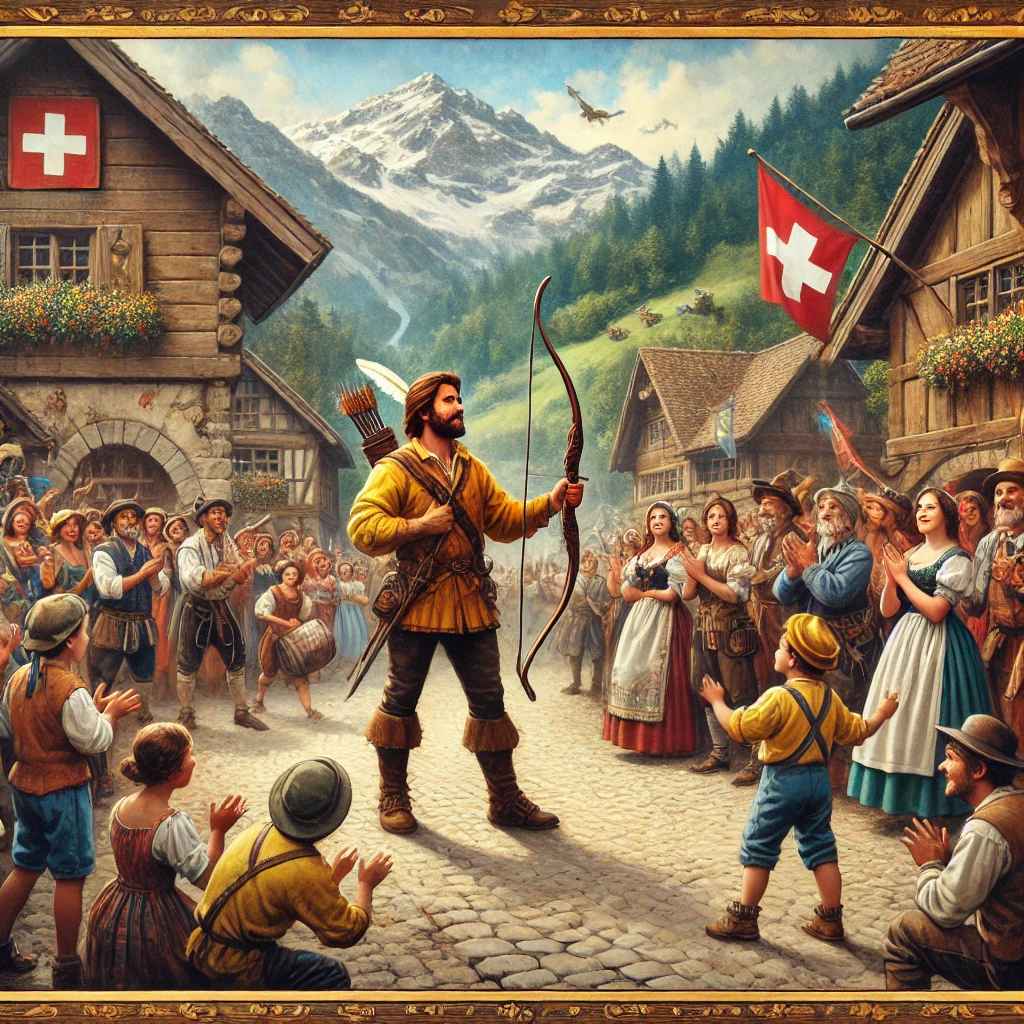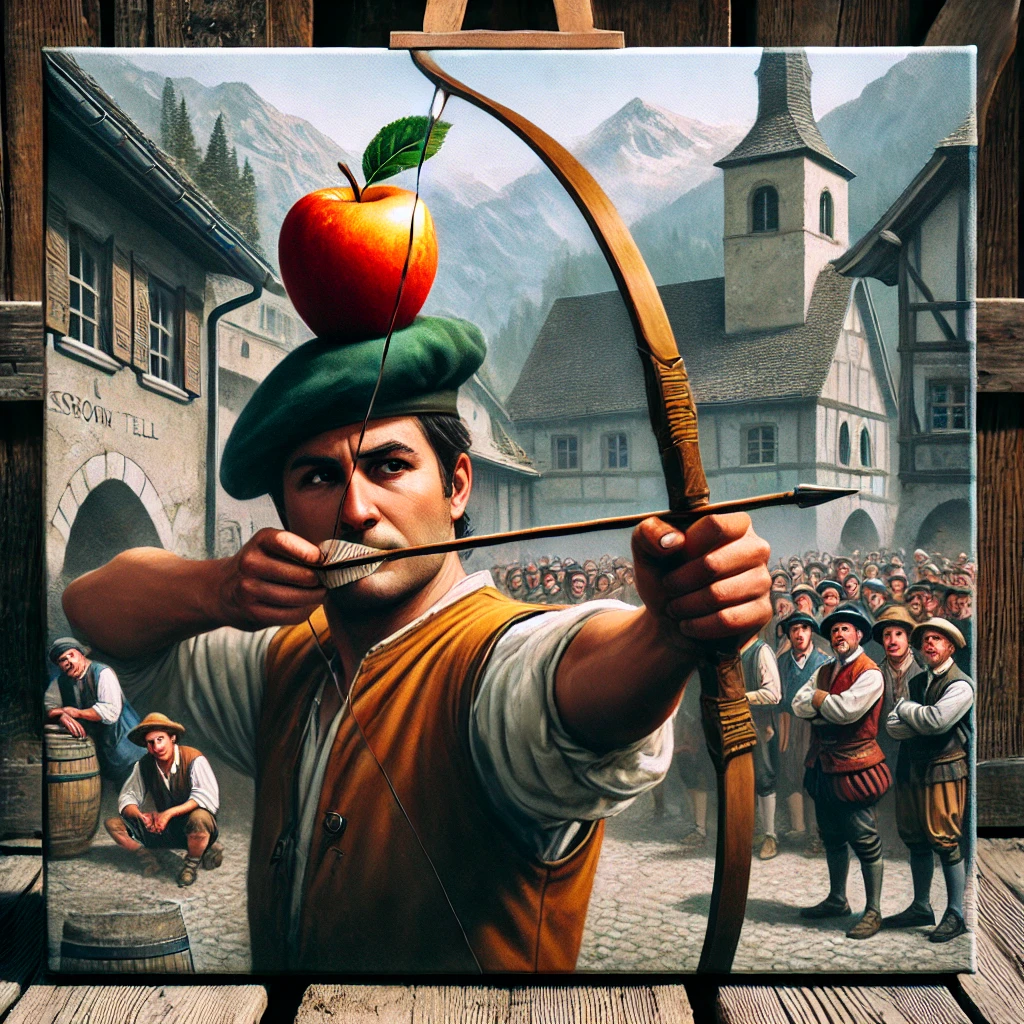Legend has it that on November 18th, 1307, Swiss folk hero William Tell shot an apple off his son’s head with a crossbow, a remarkable feat that has since become one of the most celebrated stories of courage, defiance, and precision. The tale unfolds in the small Swiss town of Altdorf, where Tell, an expert marksman, was confronted by the brutal Austrian bailiff, Albrecht Gessler. Gessler, known for his tyranny and oppressive rule over the Swiss people, demanded that Tell shoot an apple off his son’s head to avoid punishment. With unwavering confidence and under extreme pressure, Tell succeeded in his shot, sparing his son’s life and igniting a legacy that would echo throughout history.

Symbol of Resistance Against Tyranny
The story of William Tell quickly evolved beyond a tale of skill with a crossbow. It became a powerful symbol of resistance against tyranny and oppression, particularly for the Swiss, who were under Habsburg rule. Tell’s defiance of Gessler’s authority was viewed as an act of rebellion, inspiring the Swiss people to stand up against unjust rulers. His courage to challenge tyranny without regard for his personal safety made him an enduring symbol of the desire for freedom and self-governance. The legend became a rallying point for the Swiss struggle for independence, and Tell’s name was etched into the annals of history as a champion of liberty.
The Swiss Rebellion and a Nation’s Birth
William Tell’s defiance is believed to have sparked the Swiss rebellion, leading to the formation of the Old Swiss Confederacy. Although historians debate the historical accuracy of the William Tell legend, it has served as a powerful narrative for Swiss identity and national pride. The Swiss Confederacy ultimately fought against Habsburg domination and secured their independence, laying the foundation for modern Switzerland. William Tell’s story became central to Swiss folklore and played a vital role in uniting the cantons of Switzerland under a shared goal of self-determination, setting the stage for a democratic society that would influence the world.

A Lasting Cultural and Political Impact
The tale of William Tell’s apple shot has had a lasting impact far beyond Switzerland’s borders. Artists, writers, and composers across Europe were inspired by Tell’s story, which spread rapidly in the centuries following the event. German playwright Friedrich Schiller famously wrote the play William Tell, immortalizing the hero’s journey and ideals in literature. In the 19th century, Gioachino Rossini composed the opera William Tell, whose overture became widely celebrated. Through these adaptations, William Tell became a global icon of the fight against oppression, embodying ideals that resonated with revolutionary movements worldwide.
Echoes of Freedom in Modern Times
Today, William Tell’s story is celebrated as a timeless reminder of the importance of freedom and the courage it takes to fight against oppression. In Switzerland, Tell is not only remembered as a national hero but also as a symbol of independence, courage, and resilience. His legendary feat remains a source of Swiss national pride, and his likeness is still found in artwork, literature, and public monuments. The story of William Tell continues to be taught in Swiss schools, reminding young generations of the sacrifices made to secure their freedoms.
An Icon in Pop Culture
The legacy of William Tell has also found its place in pop culture, influencing books, films, and even parodies. The iconic imagery of Tell aiming a crossbow at an apple atop his son’s head has appeared in various forms, often as a testament to precision, bravery, and the importance of resisting oppression. The story’s blend of danger, suspense, and triumph makes it a popular reference point in both entertainment and inspirational contexts. This cultural endurance underscores the universal appeal of Tell’s message: that standing up to injustice, no matter the cost, is a cause worth fighting for.

William Tell’s Enduring Legacy
More than seven centuries after he supposedly aimed his crossbow at an apple, William Tell remains a figure whose story speaks to the universal values of courage and resistance. Whether or not the tale is rooted in fact, it has inspired generations to stand up against tyranny, reminding people everywhere of the enduring power of one act of bravery. Tell’s story underscores that individual acts of defiance, even when seemingly insignificant, can resonate through history and ignite movements that shape the world.
